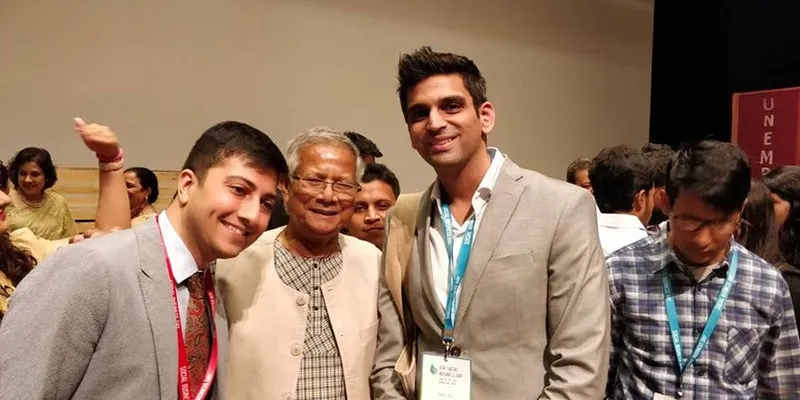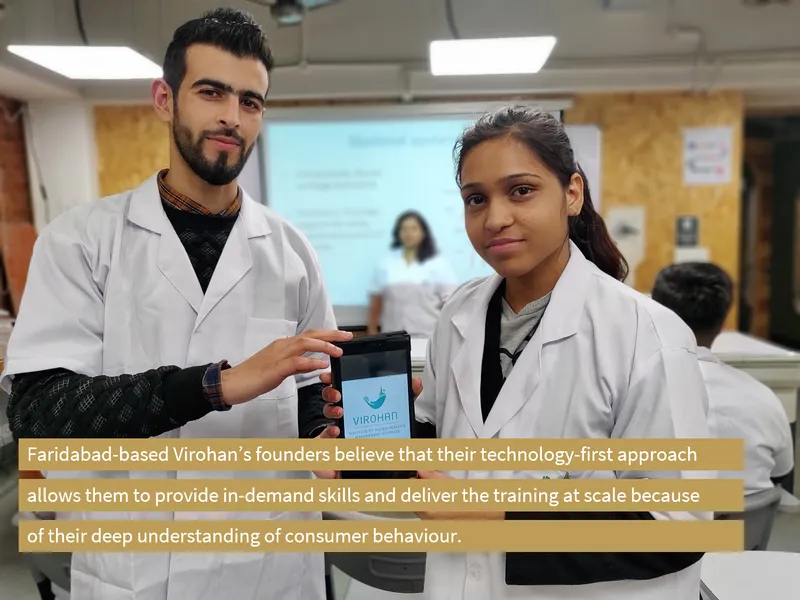This Faridabad-based startup is training a forgotten young workforce for better integration into India Inc.
Technology-led healthcare training startup Virohan has huge plans to tap the potential of India’s youth so we can reap the demographic dividend that is rightfully ours.
India ranks among the lowest in the world when it comes to workforce readiness. There is a large gap between what the market needs and the supply of a ‘skilled workforce’. This is primarily because the workforce available lacks the skills required by industry to be employed, especially in the healthcare sector. Traditional healthcare vocational training industry is highly fragmented and has failed to bridge this gap. And hence the need for an intervention!
That intervention is Virohan, an innovative healthcare vocational training solution for Bharat Inc.

(L to R) Kunaal Dudeja (Co-Founder & CEO, Virohan), Prof. Muhammad Yunus (Nobel Laureate, Founder of Grameen Bank), and Nalin Saluja (Co-Founder & CTO, Virohan)
What the Faridabad-based startup provides is a technology-led solution to standardise and aggregate the offerings of the highly fragmented healthcare vocational training industry. It uses a technology stack to lower operational expenses and increase viable penetration by providing standardisation and improved efficiency across operations. The outcome is two pronged: long-term careers with progressive livelihood for youth along with profitability at scale for healthcare vocational training providers.
Nalin Saluja, Co-founder and CTO at Virohan, says,
“While vocational training received a lot of funding from the government and CSR over the last five years, many of the operators who provided training operated low-quality institutions with opportunistic business models and a short-term view. That has negatively impacted the sector and its reputation."
The bottom of the pyramid
With its goal to impact lives at scale, Virohan has focused largely on the low-income segment of the population. More than 70 percent of their students come from households with an income of less than Rs. 2.5 lakh per annum.
As Nalin points out, the healthcare industry doesn’t just offer aspirational career opportunities to students, but great career progression too. According to him, technicians who might start their careers with a starting salary of about Rs 1.7 lakh - Rs 2 lakh a year can start earning Rs 6 lakh to Rs 8 lakh within five to eight years, and even more with the right experience.
“This allows youth from low-income groups to break class barriers and rise up all the way up to upper middle class in one generation. There are very few such opportunities for low-income youth today,” he adds.
What’s even more encouraging is that half their students are women.
But here’s the clincher: 85 percent of Virohan trainees have achieved gainful employment after completing their training programme.
“The majority of our female students who found jobs in the healthcare sector through Virohan have said they feel financially empowered and are usually the first in their families to step out for a job,” Nalin says.
According to IBEF, in 2015, the Indian healthcare sector became the fifth largest employer, employing close to five million people. It is also growing at a CAGR of 22.87 percent over 2015-2010 to reach $289 billion. The number of trained personnel needed too is pegged at 7.4 million, according to the National Skill Development Corporation. This is double the size of the existing workforce, and yet the sector remains under-served.
As Kunaal Dudeja, Co-founder and CEO at Virohan, explains,
“Our goal is to connect at least 250,000 youth with jobs in the healthcare sector by 2024. While that itself is perhaps small, given the scale of the problem, this target itself means an impact on over a million lives. That would definitely mean success to all of us.”
Using apps for the ground network
Virohan has broken down all operational workflows at a vocational training centre into different technology products, each one designed for a different user type. For example, there’s the admissions app for field agents such as 'anganwadi' workers, ‘asha’ workers, etc. Then there’s the mySales app for telecallers and counsellors, a separate platform for financing, and the myClassroom product for delivering blended learning. In the works is a myCareer app for students.
Working with the government
Virohan has also received funding from the National Skill Development Corporation for capacity building and regulatory approval to train and certify students in the country under the aegis of the Ministry of Skill Development and Entrepreneurship of the Government of India. It has also tied up with the Indian Medical Association to run co-branded diploma programmes.
“As a premier healthcare body in India, a diploma endorsed by the IMA gives a fillip to our students’ careers,” Kunaal says.
In the private sector, Virohan works with partners like medical equipment maker GE Healthcare and is starting a partnership with Siemens Healthineers soon, besides 350+ hospitals and labs across India.
It has also expanded its associations to the social impact space. Yunus Social Business, a profit and non-profit venture fund that turns philanthropic donations into investments in sustainable social businesses, is also an investor in Virohan.
Then there is Social Venture Partners (SVP), a global philanthropic movement guided by a simple yet powerful idea: as individuals we make a difference, together we change the world. Through SVP, Virohan gets regular mentorship and strategic advice from two lead partners: Vikas Gambhir (Director at Grant Thornton) and Joydeep Bhattacharya (Partner at Bain & Co.), besides other support from several senior members at SVP India. Apart from that, Priya Shah (Principal at Yunus Social Business) and Paarul Dudeja (Director at Accion Venture Lab) are on Virohan’s board.
The organisation also works with AWS EdStart, an edtech startup accelerator that helped Virohan quickly scale up its technology capabilities, especially in the area of artificial intelligence and machine learning.
Technology-first approach
Other players in the skilling space within healthcare vocational training include large corporates such as Vivo Healthcare, Apollo Medskills, and Max Institute of Health Education and Research, among others. There are also startups like Capacita Connect, a Jaipur-based skill development startup that helps students with counselling and skilling and placement/employment to helping industries with the right manpower.
However, Kunaal believes that Virohan’s technology-first approach allows them to provide the skills that are in demand and deliver these programmes at scale because of their deep understanding of consumer behaviour. “This is very different from what our competitors are focusing on,” Kunaal points out. He adds,
“We believe that in the next five years, the healthcare vocational training sector will undergo consolidation where all players with high-quality training will scale...That is exciting for us as the only way this model succeeds is if we are all focused on outcomes.”

Piggy-banking on the JAM trinity
The idea for the Virohan Tech Stack is to create an India Stack-like infrastructure for the vocational training industry. There are huge similarities between the design of the two frameworks. Virohan’s Tech Stack leverages the JAM (Jan Dhan, Aadhaar, Mobile) trinity to be able to solve for the healthcare vocational training industry across aspects like mobilisation, financing, training, certification, and placement. For instance, their trainees receive an accredited digital certificate at the end of their training, which is linked to their digital IDs.
“It is a modular platform with open APIs that enables the plug-and-play installation of any module at any training centre. We use machine learning to leverage the data repository to deliver differentiated insights to various stakeholders. This means we are also able to provide timely intervention for students to improve their engagement and overall likelihood of success,” Nalin says.
He adds that the Tech Stack is built with a deep understanding of user behaviour and future-ready architecture to provide affordable, accessible, and quality training with speed at scale.
Hopeful of a bright future
Virohan wants to re-engineer and lead healthcare vocational training and become the preferred partner of the healthcare industry to meet its workforce requirements, ranging from OEMs to hospitals, labs, diagnostic centres, and clinics.
Overall, this should allow them to train over 250,000 students in the next five years with grassroot-level penetration across the country. While that number itself is perhaps small, given the scale of the problem, this target itself means an impact on over a million lives. And that’s a great start.








